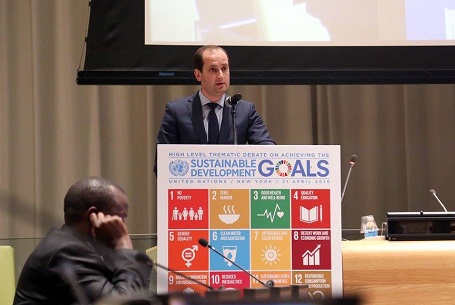Foreign Minister speaks at UN debate: Janelidze highlights Govt’s efforts for Georgia’s sustainable development

Georgia’s Foreign Minister Mikheil Janelidze says the current Government of Georgia is doing its best to ensure a high standard of justice, equality and protection of human rights in Georgia.
Janelidze said this yesterday in his address to international officials at a United Nations (UN) themed debate dedicated to the goals of sustainable development.
The Minister widely spoke about the major targets of Georgia’s development that aimed to ensure the country’s fast integration into the European family, creating a safe and stable environment for all people and providing economic progress.
He stressed the Government launched an "ambitious agenda” to defeat Georgia’s main, existing challenge – unemployment.
When speaking about sustainable development, Janelidze spoke about the Government’s new four-point reform agenda that envisaged fundamental changes to the education system and tax system, as well as added support for economic development, new infrastructure and open governance.
Janelidze said the systemic reforms in education would reduce an oversupply of graduates in professions where demand was low, and conversely ensure enough people graduated with qualifications that were necessary for the economy.
Additionally, the four-point reform agenda would address high-level infrastructure and economic opportunities, and ensure Governmental services for businesses were accessible and served the country’s sustainable development.
At the UN discussion Minister Janelidze spoke about Georgia’s two occupied regions Abkhazia and Tskhinvali (South Ossetia) and emphasised the role of local authorities and the international community in solving conflicts.
Janelidze said the Georgian Government, together with its foreign partners, were doing its utmost to support the people living in the occupied regions so they also benefitted from the future success.
 Tweet
Tweet  Share
Share